

10 Learnings from 10 Years of Brain Pickings. I remember my first awareness of mortality as a child in Bulgaria.
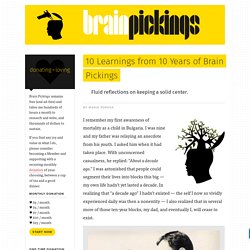
I was nine and my father was relaying an anecdote from his youth. I asked him when it had taken place. With unconcerned casualness, he replied: “About a decade ago.” I was astonished that people could segment their lives into blocks this big — my own life hadn’t yet lasted a decade. In realizing that “a decade ago” I hadn’t existed — the self I now so vividly experienced daily was then a nonentity — I also realized that in several more of those ten-year blocks, my dad, and eventually I, will cease to exist. After one such time-block, I left Bulgaria for America, lured by the liberal arts education promise of being taught how to live.
All the while, I was working numerous jobs to pay my way through school. 10 LEARNINGS FROM 10 YEARS OF BRAIN PICKINGS ANIMATED (MARIA POPOVA) 9 Learnings from 9 Years of Brain Pickings. On October 23, 2006, Brain Pickings was born as an email to my seven colleagues at one of the four jobs I held while paying my way through college.
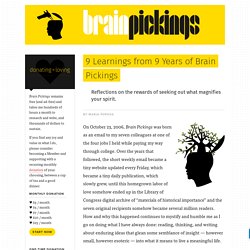
Over the years that followed, the short weekly email became a tiny website updated every Friday, which became a tiny daily publication, which slowly grew, until this homegrown labor of love somehow ended up in the Library of Congress digital archive of “materials of historical importance” and the seven original recipients somehow became several million readers. How and why this happened continues to mystify and humble me as I go on doing what I have always done: reading, thinking, and writing about enduring ideas that glean some semblance of insight — however small, however esoteric — into what it means to live a meaningful life. As Brain Pickings turns nine, I continue to stand by these seven reflections, but the time has come to add two more. Allow yourself the uncomfortable luxury of changing your mind.
And here are the two new additions: 16 Elevating Resolutions for 2016 Inspired by Some of Humanity’s Greatest Minds. What if we could augment the bucket-list of typical New Year’s resolutions, dominated by bodily habits and pragmatic daily practices, with higher-order aspirations — habits of mind and spiritual orientations borrowed from some of humanity’s most timelessly rewarding thinkers?
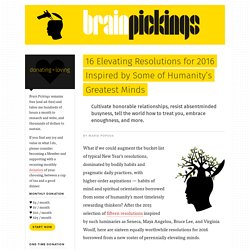
After the 2015 selection of fifteen resolutions inspired by such luminaries as Seneca, Maya Angelou, Bruce Lee, and Virginia Woolf, here are sixteen equally worthwhile resolutions for 2016 borrowed from a new roster of perennially elevating minds. One of the most influential poets of the twentieth century and a woman of unflinching conviction, Adrienne Rich (May 16, 1929–March 27, 2012) became the first and to date only person to decline the National Medal of Arts in protest against the growing monopoly of power and the government’s proposed plan to end funding for the National Endowment for the Arts. In it, she writes: In one of the most potent letters, he writes: More here. Fromm writes: More here. Self-Refinement Through the Wisdom of the Ages: 15 Resolutions from Some of Humanity’s Greatest Minds.
At the outset of each new year, humanity sets out to better itself as we resolve to eradicate our unhealthy habits and cultivate healthy ones.
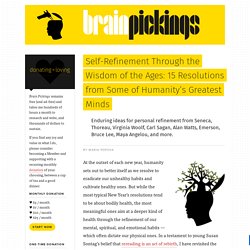
But while the most typical New Year’s resolutions tend to be about bodily health, the most meaningful ones aim at a deeper kind of health through the refinement of our mental, spiritual, and emotional habits — which often dictate our physical ones. In a testament to young Susan Sontag’s belief that rereading is an act of rebirth, I have revisited the timelessly rewarding ideas of great thinkers from the past two millennia to cull fifteen such higher-order resolutions for personal refinement. No one has made a more compelling case for the bodily and spiritual value of walking — that basic, infinitely rewarding, yet presently endangered human activity — than Henry David Thoreau.
But the passage that I keep coming back to as I face the modern strain for presence in the age of productivity, 150 years later, is this: Read more here. Albert Camus on Strength of Character and How to Ennoble Our Minds in Difficult Times. In 1957, Albert Camus (November 7, 1913–January 4, 1960) became the second youngest laureate of the Nobel Prize in Literature, awarded to him for work that “with clear-sighted earnestness illuminates the problems of the human conscience in our times.”
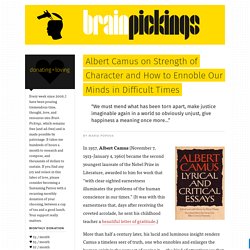
(It was with this earnestness that, days after receiving the coveted accolade, he sent his childhood teacher a beautiful letter of gratitude.) More than half a century later, his lucid and luminous insight renders Camus a timeless seer of truth, one who ennobles and enlarges the human spirit in the very act of seeing it — the kind of attentiveness that calls to mind his compatriot Simone Weil, whom he admired more than he did any other thinker and who memorably asserted that “attention is the rarest and purest form of generosity.”
At only twenty-seven, Camus writes: We have not overcome our condition, and yet we know it better. If we are to save the mind we must ignore its gloomy virtues and celebrate its strength and wonder.
Brain Pickings.